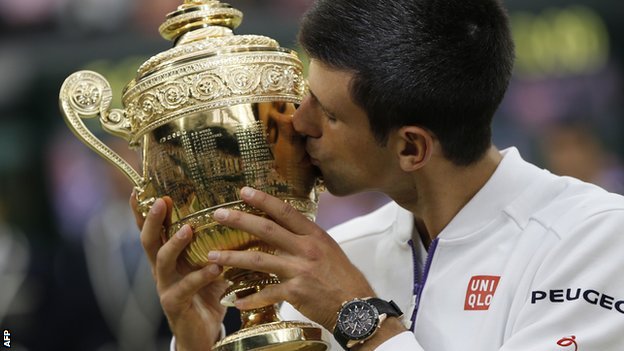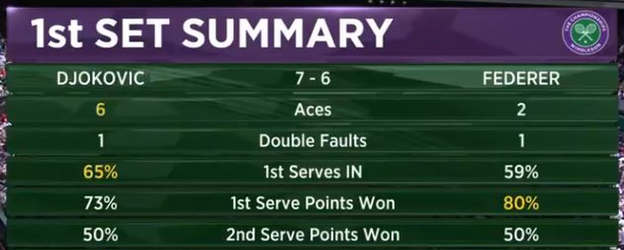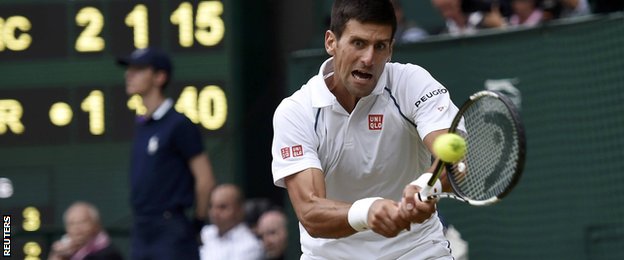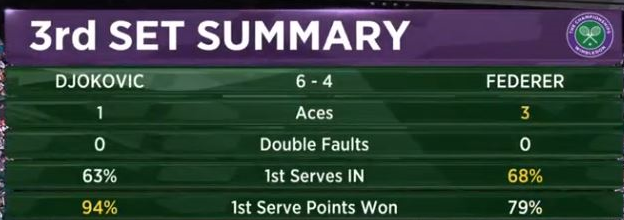To the victor go the spoils. To Novak Djokovic, after his four-set triumph over Roger Federer, go the condolences too.
It’s not the instinctive emotional response when someone has just won their ninth Grand Slam title and trousered £1.8m in the process. But Federer is Centre Court’s sun king, and the man who dethrones him must carry a burden as inescapable as it is unfair.
On Sunday the 33-year-old Federer, seven times a champion on this venerated turf, had seemingly every man, woman and smartly dressed steward at his back as he attempted to defeat both precedent and the passing years.
Which left Djokovic – reigning champion, world number one – as the loneliest man in south-west London, the cold-hearted killer of the Federer fairytale and his adoring supporters’ romantic dreams.
What can he do? He is the bad guy who has done nothing wrong. He hasn’t taken candy from a baby or cancelled Christmas or constructed a giant death ray aimed at the planet’s major cities.
Instead he has gone past four greats in the list of all-time Grand Slam winners: Andre Agassi, Jimmy Connors, Ivan Lendl, our own dear Fred Perry. He has two more Slams than John McEnroe, three more than Stefan Edberg and his coach Boris Becker. Bjorn Borg is in his sights.
And he has done so with a game without flaws – such accuracy on his groundstrokes that chalk dust accompanies almost every shot, such power that a man who can shut down space and angle like Federer is reduced to chase and retreat, such speed and intensity on defence that an opponent must hit multiple winners to seal a single point.
The fans on Centre Court took plenty of photographs of Djokovic posing with the trophy, but the vast majority were rooting for Federer
At one stage, with Federer at a set apiece and a break down in the third, a topspin lob from the old champ was greeted ecstatically from the cheaper seats. “YOU’RE A GENIUS, ROGER!”
So what does that make Djokovic, who has now beaten Federer in successive Wimbledon finals and won four Grand Slam titles since his opponent took his last?
Djokovic is a wonder of a ferociously competitive age, a talent who has not only prospered through the latter part of Federer and Rafael Nadal’s golden years but emerged strongest as fresher rivals like Andy Murray and Stan Wawrinka have fought them for supremacy.
Tim Henman, four-time Wimbledon semi-finalist |
|---|
|
“When you reflect on how Novak has left no stone unturned, his serving has been getting better all the time, his diet, his preparation, it is all first class. He is in his prime, he is 28, I see him at the top of the game for five or six years. I see him adding to his Grand Slam collection very soon.” |
And yet he is inevitably cast as the strait-laced villain to those more flamboyant heroes, as stern and sinister as Terence Stamp in Superman II, not so much General Zod as General Djok.
Once again this was a deserved triumph. It was expected to be a contest as close as their track records – 39 meetings before Sunday yet just one win separating them, six wins apiece in their 12 previous Grand Slam matches.
At times it was, just as the quality of their tennis reflected their status as the top two men in the world, the unholy level reaching a peak in an extraordinary second-set tie-break in which Federer saved seven set points to somehow drag himself level.
Roger Federer’s first-serve percentage in the first set was 59% – it was 85% against Andy Murray in the semi-final
But even when there was parity on the scoreboard there was a disparity on court – not big, and not always, but there on the key points and in the critical exchanges.
In a first set that saw him lose in a one-sided tie-break, Federer made just 59% of his first serves. In the first set of his flawless semi-final against Andy Murray he had been at 85%. He made 11 unforced errors to Djokovic’s three and double-faulted on set point.
The primary reason he had sent Murray packing in straight sets had been the strength of that first serve. Murray had profited in the rallies. There just weren’t enough of them.
To beat Djokovic he would have to maintain that level. Instead it fell back, and into that space the champion charged.
Federer had his opportunities, the sort of openings that in his prime he would have seized. He broke the younger man to love in the sixth game of the first set, but then – having faced just four break points on his serve in the first 12 days of the championships – was broken back in his very next service game.
Novak Djokovic recovered quickly from failing to take seven set points in the second set
Two set points came at 6-5. On both occasions Djokovic’s serve proved as impenetrable as Federer’s would fallible, just as the depth of his forehand would rescue him again from break points in the second set.
Federer once controlled the tempo of these Wimbledon finals. This time, with returns landing on his toes and groundstrokes at the base of his racquet swing, his timing was disturbed and his aura diminished.
Djokovic should never have let the second set slip. Having seen it escape, he then came back at a fiercer lick still – manufacturing break points in Federer’s first service game of the third, taking them in his second.
When rain briefly swept in with the dark grey clouds, it promised a little light for Federer; when the weather had interrupted his 2012 final against Murray at exactly the same stage, he had returned to win the next two sets and with them the title.
Djokovic, as impervious to omens as to happy endings, instead shut him down.
Djokovic lost only 6% of points on his first serve in the third set
In that third set he would win 94% of points on his first serve. In the fourth he broke Federer again with ease, hitting 12 winners, winning almost half the points when receiving, driving his man back, tugging him from tramline to tramline.
By the end, 35 errors having flowed off his once immaculate racquet, Federer looked both confused at the absence of the old sorcery and increasingly weary.
Such was Djokovic’s probing power that Federer had been made to run almost a metre more every point than the younger man. He did not look like the oldest man to make a Wimbledon singles finals in 41 years – he never would – but the true believers knew, even as they wished for one final miracle.
The mourning should not go on for long. Djokovic deserves more.
In the coming years, he should get it.


















